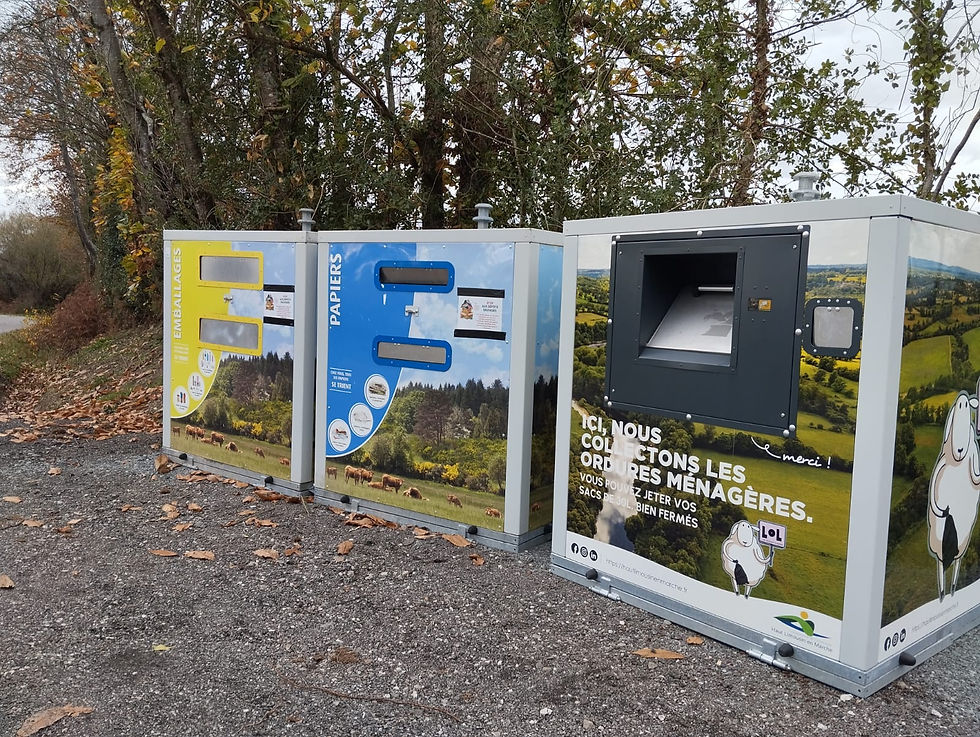Bin Collection & Déchèteries in France: How Waste Disposal Really Works
- A New Life

- Nov 19, 2025
- 4 min read
Moving to France comes with many charming discoveries — village markets, quiet mornings, long lunches — and then a few practical realities.

One of the most important (and often most confusing) day-to-day systems to understand is how bin collection and waste disposal works. France takes recycling and waste management seriously, but the rules differ from one region to another, and newcomers often find themselves wondering:When do the bins go out? Why are there no wheelie bins? What is a déchèterie and why do I need a badge?
Here’s your clear, friendly guide.
How Bin Collection Works in France
Unlike the UK, France doesn’t have a single national system for rubbish collection. Instead, each commune or intercommunalité (local authority group) manages its own schedule, rules, and equipment. This means that what happens in one village may be completely different just 5 km away.
1. The Types of Household Waste Bins
Most areas use some combination of:
🟡 Recycling (Tri Sélectif)
Recycling in France is colour-coded, but the colours vary by region.Typically:
Yellow: plastics, cardboard, paper, cartons, aluminium, tins
Blue (in some regions): paper
Green: glass (often collected at communal bottle banks rather than at home)
Since 2023, France has rolled out “recyclable packaging for all”, meaning all plastics, even yoghurt pots, film lids and trays, go into the recycling bin.
⚫ General Waste (Ordures Ménagères / OM)
This is the non-recyclable rubbish.In many rural areas you’ll place these in communal containers (“moloks”) instead of personal bins.
🟢 Glass (Verre)
Usually not collected from homes.Instead, villages have glass recycling points.
2. Individual Collection vs. Communal Bins
Depending on where you live, you may have:
🚚 Door-to-door collection
Common in suburbs and towns. You’ll receive:
a household wheelie bin for general waste
a recycling bin
possibly a separate food waste caddy (as France is rolling out bio-waste separation)
🏞 Communal collection points
Very common in rural areas:
Large shared bins placed around the commune
You take your rubbish there whenever you want
No need to wait for “bin day”
Often combined with access-control systems (“badges” or “TAGS”) to reduce misuse
3. When Is Bin Day?
Each commune publishes a collection calendar, delivered to your letterbox or downloadable from the mairie or your waste authority’s website.
Services usually include:
Weekly or bi-weekly general waste collection
Fortnightly recycling
Glass collected at fixed points
Green waste (déchèterie or kerbside depending on commune)
The Déchèterie: France’s Household Recycling Centre
If you’re moving to France, you’ll become very familiar with the déchèterie — the local waste and recycling centre. It’s where you take anything too big, bulky or unusual for normal bins.
Most French residents use their déchèterie every few weeks, especially if renovating a property.
What You Can Take to a Déchèterie
Garden waste
Wood, metal, rubble
Furniture, mattresses
Old appliances (fridges, washing machines)
Paints, chemicals, oils (in designated areas)
Electronics
Textiles
Cardboard in large quantities
Access: You Usually Need a Badge or Proof of Address
Most déchèteries now require:
a resident card (carte d’accès), or
your proof of address (justificatif de domicile), such as an electricity bill.
Some communes give you:
a sticker for your windscreen
a QR-coded badge
limited annual visits for certain waste types (rubble, timber, large items)
Applying is usually done:
at your local mairie,
online via your waste authority, or
directly at the déchèterie with your ID and proof of address.
Waste-Related Taxes: TEOM & REOM Explained
Waste disposal is not free in France — it’s funded through one of two local taxes charged to homeowners or tenants.
1. TEOM (Taxe d’Enlèvement des Ordures Ménagères)
The most common.It appears on your taxe foncière bill.Paid by property owners, often passed on to tenants.
2. REOM / REOMi (Redevance d’Enlèvement des Ordures Ménagères)
A direct fee — sometimes based on:
number of household members
bin size
number of bin collections
access-controlled usage of communal containers
In rural areas, REOMi encourages people to recycle more and produce less waste.
Food Waste & Composting: Increasingly Mandatory
Since 2024, France has introduced national rules to encourage separate bio-waste collection.Depending on your commune you may have:
a brown food-waste bin
a shared neighbourhood compost area
a discount on compost bins offered by the commune
separate drop-off points at the déchèterie
Some areas have already gone fully “zero waste” for kitchen scraps.
Practical Tips for New Residents
✔ Register for waste collection and your déchèterie card as soon as you move in. The mairie or intercommunalité will guide you.
✔ Check what goes in each bin — the rules really do vary by department. Most areas print simple posters or fridge cards.
✔ Expect strict rules on rubble, construction waste and large loads. Often weighed, limited per year, or chargeable.
✔ Never leave rubbish by communal bins. It’s strictly enforced and can lead to fines.
✔ Use the glass recycling points — glass almost never goes in the household recycling bin
✔ Learn the meaning of “Tri Sélectif”. It’s the key phrase for all things recycling.
Why This Matters For Property Buyers & New Residents
Understanding the waste system is surprisingly important when choosing a home in France.
It affects:
convenience (door-to-door vs communal bins)
annual local taxes
renovation waste disposal plan
rules for gîtes and holiday rentals
eco-responsibility (taken seriously in many communes)
It’s one of those small but vital areas of French life that shows how communities operate — often efficiently, sometimes quirks included, but always with a focus on environmental responsibility.
